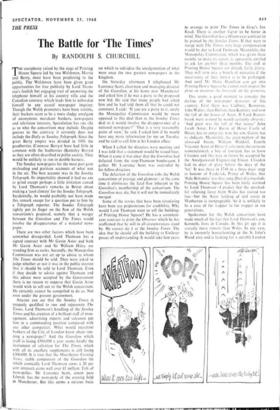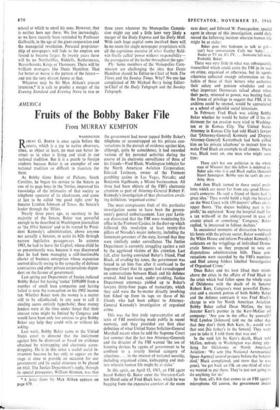The Battle for 'The Times'
THE PRESS
By RANDOLPH S. CHURCHILL
THE cacophony raised by the siege of Printing House Square led by two Welshmen, Morris and Berry, must have been perplexing to the public. The Welshmen have been given great opportunities for free publicity by Lord Thom- son's foolish but engaging trait of answering the telephone himself at his country villa and the Canadian courtesy which leads him to unburden himself to any casual newspaper inquirer. Though the Welsh promoters have been voluble, their backers seem to be a mute sludgy amalgam of anonymous merchant bankers, newspapers and television interests. Speculation has run rife as to who the consortium may include. Despite guesses to the contrary it certainly does not include the Daily or Sunday Telegraph. Since the great Berry empire was divided in 1956 the goodberries (Camrose Berrys) have had little in common with the badberries (Kemsley Berrys) as they are often described in polite society. They would be unlikely to run in double harness.
The Sunday newspapers for the most part gave misleading and partisan accounts of what was in the air. The best account was in the Sunday Telegraph. Its impartiality showed it had no axe to grind except perhaps a little irritation caused by Lord Thomson's remarks in Beirut about making a 'cool climate' for the Sunday Telegraph. Incidentally, be would probably not have made this remark except for a question put to him by a Telegraph reporter. The Sunday Telegraph rightly put its finger on the flaw of the Welsh consortium's proposal, namely that a merger between the Guardian and The Times would involve the disappearance of a national news- paper.
There are two other factors which have been somewhat disregarded. Lord Thomson has a signed contract with Mr Gavin Astor and both Mr Gavin Astor and Sir William Haley are standing firm as rocks. Secondly, the Monopolies Commission was not set up to advise to whom The Times should be sold. They were asked to judge whether or not it was in the public interest that it should be sold to Lord Thomson. Even if they decide to advise against Thomson and this advice were accepted by the Government there is no reason to suppose that Gavin Astor would wish to sell out to the Welsh consortium. He certainly cannot be compelled to do so. Not even under the present government.
Anyone can see that the Sunday Times is uniquely qualified to run and rejuvenate The Times. Lord Thomson's handling of the Sunday Times and his creation of a brilliant staff of man- agement, advertising experts and salesmen put him in a commanding position compared with any other competitor. What would merchant bankers of the City of London know about run- ning a newspaper? And the Guardian which itself is losing £500,000 a year seems hardly the instrument of salvation for The Times, which with all its ancillary supplements is still losing £300,000. It is true that the Manchesler Evening News, stable companion of the Guardian (in which comically Lord Thomson owns a 20 per cent interest), earns well over £1 million. Talk of monopolies. Mr Laurence Scott, simon pure Liberal, has the monopoly of the evening field in Manchester. But this seems a curious basis
on which to subsidise the amalgamation of what were once the two greatest newspapers in the kingdom.
On Saturday afternoon 1 telephoned Mr Laurence Scott, chairman and managing director of the Guardian, at his home near Manchester and asked him if he was a party to the proposed new bid. He said that many people had asked him and he had told them all that he could not comment. I said: 'If you are a party to it, surely the Monopolies Commission would be more opposed to this deal than to the Sunday Times deal as it would involve the disappearance of a national newspaper?' That is a very reasonable point of view,' he said. I asked him if he would have any more information for me on Tuesday and he said to call him at his London office.
When I called the directors were meeting and I was told that a statement would be issued later. When it came it was clear that the Guardian had defected from the stop-Thomson bandwagon. I gather Mr Laurence Scott was overruled by his fellow-directors.
The defection of the Guardian robs the Welsh consortium of prestige and glamour: at the same time it eliminates the fatal flaw inherent in the Guardian's membership of the consortium. The Guardian may die, but it will not be immediately merged.
Some of the stories that have been circulating have been too preposterous for credibility. Why would Lord Thomson want to sell the buildings of Printing House Square? He has a seventeen- year contract to print the Observer which he has reaffirmed that he will in all circumstances stand by. He cannot do it at the Sunday Times. The idea that he should sell the building to Unilever passes all understanding. It would take him years to arrange to print The Tunes in Gray's Inn Road. There is another factor to be borne in mind. The Guardian has a fifteen-year contract to be printed by the Sunday Times. If they were to merge with The Times, very large compensation would be due to Lord Thomson. Meanwhile, the Monopolies Commission. which was given three months to make its report, is apparently entitled to ask for another three months. The staff at Printing House Square are already fairly jittery. They will turn into a bunch of neurotics if the uncertainty of their future is to be prolonged. And until Mr Denis Hamilton can get into Printing House Square he cannot even inspect the plant or examine the livestock on the premises.
This seems a good moment to consider the decline of the newspaper dynasties of this country. First there was Cadbury. Rowntree, John Walter, then Hulton, then Kemsley and now the fall of the house of Astor. If Lord Beaver- brook were around he would certainly observe: 'And great was the fall of that house.' John Jacob Astor, First Baron of Hever Castle of Hever, has to emigrate; now his son, Gavin, has to abdicate. Meanv‘hile, the great-nephew of the aforesaid baron, William Waldorf, Fourth Viscount Astor of Hever Castle (note the tortuous nomenclature), a boy of fourteen, has to leave Cliveden and this may in future be occupied by the Amalgamated Engineering Union. Cliveden had its days of glory before the days of the 'Set.' It was there in 1740 in a three days' orgy in honour of Frederick, Prince of Wales, that 'Rule Britannia' was first sung.Quel dc;gringolade. Printing House Square has been fairly stormed by Lord Thomson—I predict that the unasked- for relieving force from Wales has started too late—but the Astor holding of real estate in Manhattan is inexpugnable. So it is unlikely to be a case of fur trapper to fur trapper in ten generations.
Spokesmen for the Welsh consortium have made much of the fact that Lord Thomson's son, Kenneth, lives in Canada. In this jet age it is scarcely more remote than Wales. In any case, he is currently house-hunting in the St John's Wood area and is looking for a suitable London
school at which to enrol his sons. However, that is neither here nor there. We live increasingly, as we have recently been reminded by Professor Galbraith, in the age of the giant corporation and the managerial revolution. Personal proprietor- ship of newspapers will fade as the empires are forced to become larger. In twenty years there will be no Northcliffes, Riddells, Rothermeres, Beaverbrooks, Kings or Thomsons. There will be brilliant managers like Denis Hamilton. That for better or worse is the pattern of the future— and not the very distant future at that.
Whatever may be Sir Max Aitken's present intention,* it is safe to predict a merger of the Evening Standard and Evening News in two or three years whatever the Monopolies Commis- sion might say and a little later very likely a merger of the Daily Express and the Daily Mail. With such huge capital sums involved there will be no room for single newspaper proprietors with all the capricious exercise of what Stanley Bald- win finally called 'power without responsibility— the prerogative of the harlot throughout the ages.'
PS: Some members of the Monopolies Com- mission are challenging the idea that Denis Hamilton should be Editor-in-Chief of bath The Times and the Sunday Times. Why? No one has complained of Mr Michael Berry being Editor- in-Chief of the Daily Telegraph and the Sunday Telegraph.















































 Previous page
Previous page